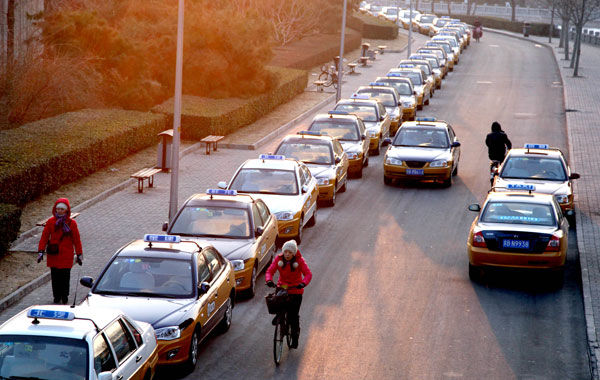Beijing cabbies fear loss of business
Updated: 2013-04-18 02:10
By XU WEI (China Daily)
|
||||||||
Beijing's decision to increase taxi fares has fueled fears among cab drivers that it could lead to a slump in passengers.
City authorities will adjust tariffs in the next two months, with a hearing taking place to obtain advice from experts, taxi drivers and companies, and legislators.
Although the move is aimed at raising drivers' incomes, many cabbies fear it could result in fewer people taking cabs.
 |
|
Many taxis are parked near Binhe Road in Beijing's Deshengmen area. Han Haidan / For China Daily |
"There was an obvious slump when the pricing unit for each kilometer was raised in Beijing and it took a long time for the market to recover," said Li Guang, a 31-year-old driver for the Xinghe Taxi Co.
He said he hopes the authorities will take a possible slump in business into consideration when raising prices, and offer subsidies when necessary.
Jiang Mingsheng, 56, voiced similar concerns and said he hopes taxi companies will reduce administration fees in the months after prices are raised.
However, the cabbies' fears may be unfounded.
Chen Yanyan, a professor at Beijing University of Technology's Transport Research Center, predicted it will only take a short while for the market to adapt to the changes.
"It's natural that the market will react when there is a price adjustment, but that will not affect demand in Beijing, and the experiences of other cities such as Shenzhen show that the period of recovery from the price change will be very short," she said.
Chen also said price reform will encourage more passengers in the city to take other forms of public transport and ease difficulties in hailing taxis, especially during the rush hour.
According to a regulation released on Tuesday, the city government will ensure that taxi drivers benefit from the fare rise. It did not elaborate.
In Beijing, a driver running a taxi on his own must pay 5,175 yuan ($838) a month as a company franchise fee. For a taxi run by two drivers operating 12-hour shifts, this fee is usually more than 8,000 yuan.
The city government said it will also encourage the hiring of taxis through phone calls or smartphone apps.
It will establish a taxi hailing platform and set up a number of dispatch points in the downtown area and central business district, plus 600 taxi stops outside residential communities as part of the plan to ease the taxi shortage, according to the regulation.
The municipality will also standardize smartphone apps that enable commuters to hail available taxis nearby. The additional fees for hailing a cab through the apps will be set and the current practice where drivers bargain with commuters over fares will be changed, the Beijing Daily reported, citing transport commission insiders.
Most taxis in the capital operate by picking up commuters on the streets, with at least three service hotlines run by different taxi companies.
A smartphone app now accounts for more than 30 percent of business for driver Li Guang.
He installed the app on his phone in January and now picks up more than 300 commuters a month by using it.
"The application saves time and effort to search the road for passengers, and can improve efficiency," he said.
Li said cases of being "stood up" by commuters are not uncommon, but this will not stop him from continuing to use the app.
However, apps are not an option for all cabbies, with rising cellphone bills, due to data use, a concern for some.
Jiang said, "I don't need those applications as I know, through my experience, the locations where there are more commuters in need of the service."
Jiang said using an app can increase phone bills, which he believes is an unnecessary expense.
Beijing has 255 taxi companies and more than 66,000 taxis, which account for about 6 percent of the daily travel by commuters in the city, according to the Beijing Municipal Transport Commission.
However, as the government has given priority to solving traffic congestion with use of other forms of public transport, the number of taxis in the city will not rise sharply, according to the new regulation.
Related readings:
Taxi reform a nice try
Reform of the taxi industry in Beijing is inevitable
Taxi drivers' incomes protected after price hike
Taxis to fare well after price change
Beijing to adjust taxi fare
Officer gives passengers taxi fare after subway suspension
Beijing raises taxi fuel surcharge
Beijing to get more parking spots for taxis
How to pass your next taxi audition

 Li Na on Time cover, makes influential 100 list
Li Na on Time cover, makes influential 100 list
 FBI releases photos of 2 Boston bombings suspects
FBI releases photos of 2 Boston bombings suspects
 World's wackiest hairstyles
World's wackiest hairstyles
 Sandstorms strike Northwest China
Sandstorms strike Northwest China
 Never-seen photos of Madonna on display
Never-seen photos of Madonna on display
 H7N9 outbreak linked to waterfowl migration
H7N9 outbreak linked to waterfowl migration
 Dozens feared dead in Texas plant blast
Dozens feared dead in Texas plant blast
 Venezuelan court rules out manual votes counting
Venezuelan court rules out manual votes counting
Most Viewed
Editor's Picks

|

|

|

|

|

|
Today's Top News
Boston bombing suspect reported cornered on boat
7.0-magnitude quake hits Sichuan
Cross-talk artist helps to spread the word
'Green' awareness levels drop in Beijing
Palace Museum spruces up
First couple on Time's list of most influential
H7N9 flu transmission studied
Trading channels 'need to broaden'
US Weekly

|

|







